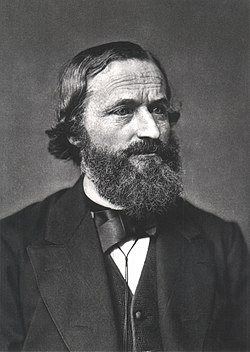
Back غوستاف روبرت كيرشهوف Arabic جوستاف كيرشهوف ARZ Gustav Kirchhoff AST Qustav Kirxhof Azerbaijani قوستاو کیرشهف AZB Густаў Кірхгоф Byelorussian Густаў Кірхгоф BE-X-OLD Густав Кирхоф Bulgarian গুস্টাফ কিরশফ Bengali/Bangla Gustav Kirchhoff BS
Gustav Kirchhoff | |
|---|---|
 | |
| Born | Gustav Robert Kirchhoff 12 March 1824 |
| Died | 17 October 1887 (aged 63) |
| Resting place | Alter St.-Matthäus-Kirchhof, Berlin |
| Alma mater | University of Königsberg |
| Known for |
|
| Spouses | Clara Richelot
(m. 1857; died 1869)Luise Brömmel (m. 1872) |
| Children | 5 |
| Awards |
|
| Honors | |
| Scientific career | |
| Fields | |
| Institutions |
|
| Academic advisors | |
| Doctoral students |
|
| Other notable students | |
Gustav Robert Kirchhoff (German: [ˈgʊstaːf ˈʁoːbɛʁt ˈkɪʁçhɔf]; 12 March 1824 – 17 October 1887) was a German chemist, mathematician and physicist who contributed to the fundamental understanding of electrical circuits, spectroscopy and the emission of black-body radiation by heated objects.[1][2] He also coined the term black body in 1860.[3]
Several different sets of concepts are named "Kirchhoff's laws" after him, which include Kirchhoff's circuit laws, Kirchhoff's law of thermal radiation, and Kirchhoff's law of thermochemistry.
The Bunsen–Kirchhoff Award for spectroscopy is named after Kirchhoff and his colleague, Robert Bunsen.
- ^ Marshall, James L.; Marshall, Virginia R. (2008). "Rediscovery of the Elements: Mineral Waters and Spectroscopy" (PDF). The Hexagon: 42–48. Retrieved 31 December 2019.
- ^ Waygood, Adrian (19 June 2013). An Introduction to Electrical Science. Routledge. ISBN 9781135071134.
- ^ Schmitz, Kenneth S. (2018). Physical Chemistry. Elsevier. p. 278. ISBN 9780128005996.
© MMXXIII Rich X Search. We shall prevail. All rights reserved. Rich X Search